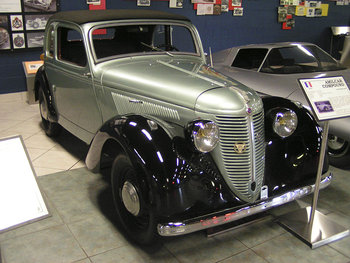Difference between revisions of "Amilcar Compound"
m |
|||
| (One intermediate revision by the same user not shown) | |||
| Line 1: | Line 1: | ||
| − | The '''Amilcar Compound''' was a | + | {{X}} |
| + | [[Image:AmilcarCompound.jpg|thumb|350px|right|'''Amilcar Compound''']] | ||
| + | The '''Amilcar Compound''' was a [[front wheel drive]] car with unitary body/chassis produced shortly before the [[Second World War]] by [[Amilcar]] and designed by the famous French engineer [[Jean-Albert Grégoire]]. It made intensive use of [[Alpax]], an [[aluminum]] alloy, but the war shortened its career. The four cylinder, side valve, 1185 cc engine had its fully [[synchromesh]] equipped, four speed, gearbox mounted in front of it with gear selection via cables. The steering was via rack and [[pinion]]. | ||
| − | Production began about 1936 but ended in | + | Production began about 1936 but ended in June 1940 due to the war after only 600 had been built. The car was available as a two door [[saloon]], [[cabriolet]] and two seat [[roadster]]. Approximately 150 Amilcar [[ambulances]] and vans were built during 1942 and 1943 using the same [[frame]]. The car was sold on the British market as the Hotchkiss Ten. |
| − | + | ||
| + | |||
| + | [[Category:Amilcar vehicles]] | ||
Latest revision as of 09:04, 5 December 2008
The Amilcar Compound was a front wheel drive car with unitary body/chassis produced shortly before the Second World War by Amilcar and designed by the famous French engineer Jean-Albert Grégoire. It made intensive use of Alpax, an aluminum alloy, but the war shortened its career. The four cylinder, side valve, 1185 cc engine had its fully synchromesh equipped, four speed, gearbox mounted in front of it with gear selection via cables. The steering was via rack and pinion.
Production began about 1936 but ended in June 1940 due to the war after only 600 had been built. The car was available as a two door saloon, cabriolet and two seat roadster. Approximately 150 Amilcar ambulances and vans were built during 1942 and 1943 using the same frame. The car was sold on the British market as the Hotchkiss Ten.
